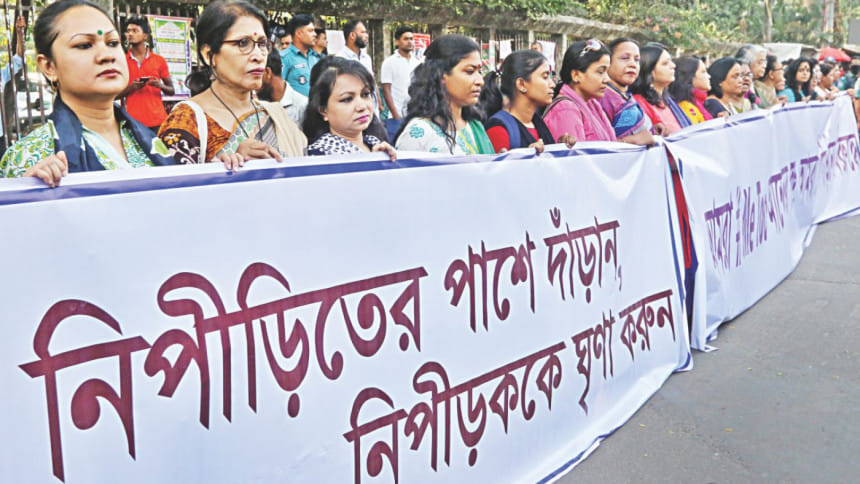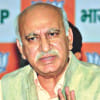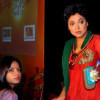#MeToo is not against all men

The #MeToo movement in Bangladesh is women's outburst brought about by accumulated abuse for decades, and it should be promoted to ensure a women-friendly country, said female journalists and activists yesterday.
As women who suffered sexual harassment and abuse years back and were silenced by societal pressure, have recently started publicly sharing their bitter experiences on social media, a quarter is working to foil the movement, they alleged at a human chain organised by Bangladesh Nari Sangbadik Kendra in front of the city's Jatiya Press Club.
“MeToo movement is not against all men, just against sexual predators. They must be exposed,” said Bangladesh Nari Sangbadik Kendra President Nasimun Ara Hoq, congratulating the nine women who have already spoken of their trauma and called out their abusers and harassers.
“For years, women and girls have been facing sexual harassment and abuse everywhere – on the street, in the bus, even at workplace -- but had remained silent. It is because they are held liable for the painful experiences they endured,” she said.
Now, she said, women and girls are speaking up through social media -- a movement that must be facilitated if the country is to be turned into a safe place for women, who make up half of the country's population.
Prof Gitiara Nasreen of Department of Mass Communication and Journalism at Dhaka University said the patriarchal society is massively repressive towards women. Toxic masculinity is so powerful that even incidents of men sexually abused by men are not talked about.
“As the #MeToo movement is gathering strength, sexual predators are afraid. It is a much-needed start towards a society that ensures equality and freedom for both men and women,” she said.
All organisations must have a code of conduct in place against sexual harassment as per a High Court order, which in 2009 directed formulating guidelines and establishing a cell to prevent sexual harassment at workplace and public places.
However, most organisations have not enforced it.
Khushi Kabir, coordinator of development NGO Nijera Kori, said there is no place that is safe for women – not home, not workplace, not public place.
“Under this circumstance, it's challenging for women to speak out against their abusers publicly. Now that the movement has begun, it has to go on,” she said.
Nagorik TV Chief Reporter Shahnaz Sharmeen said she grew up in a fearful environment and now her two daughters are also growing up in an ever-fearful social atmosphere where predators roam free.
“How long will this continue?” she asked, adding “We all -- men and women -- need to work to change this behaviour so our girls can breathe freely.”
Development activist Ferdous Ara Rumee suggested that men too should support the #MeToo movement for overall societal change.
Bangladesh Chhatra Union activist Kazi Rita said some people are asking for evidence of sexual harassment as the predators' names are being made public.
“We live in a society where it is an uphill battle to prove even a rape. How easy would it be for the victim of sexual harassment to have proof?” she said.
Sanjog Bangladesh Chief Executive Sadia Nasrin said the victim's experience of going to the law enforcers is unpleasant. This movement today can be a powerful tool for change.
Journalists Irene Niazi Manna, Udisa Islam, Sharmeen Rinvi, Mushfika Laizu, Farhana Mili, Shukkur Ali Shuvo, Mainul Alam, Sheikh Mamun, Nadia Sharmin, Shahana Siddiqi Shoma, Aparajita Sangeeta and Parveen Sultana also spoke at the event.

 For all latest news, follow The Daily Star's Google News channel.
For all latest news, follow The Daily Star's Google News channel. 








Comments